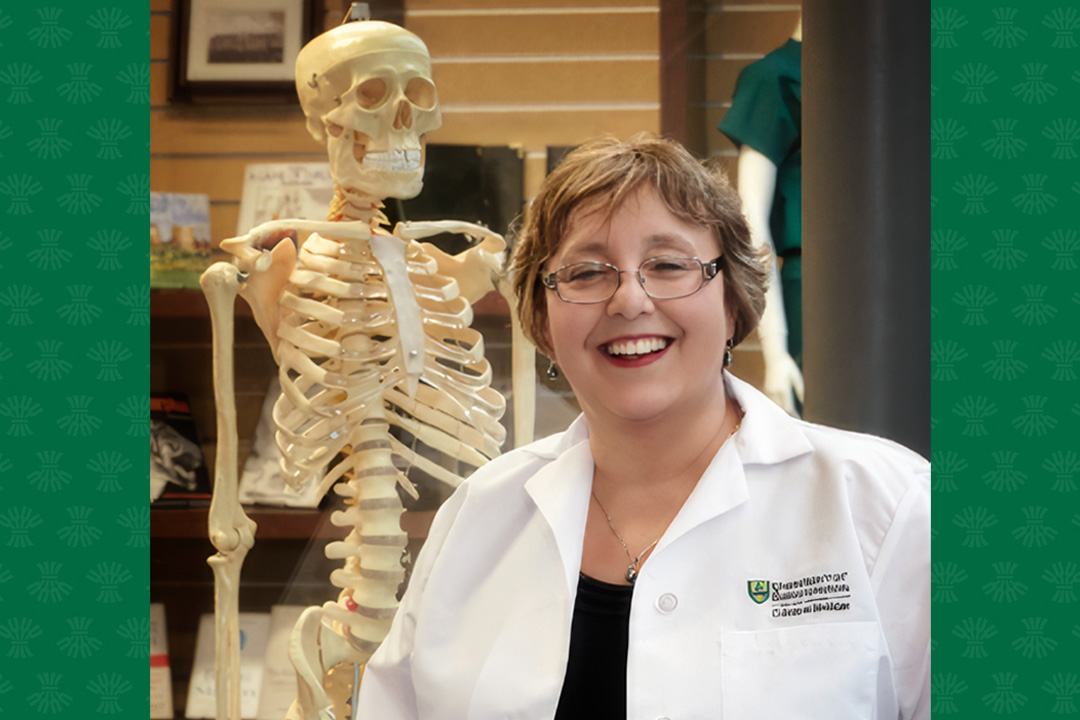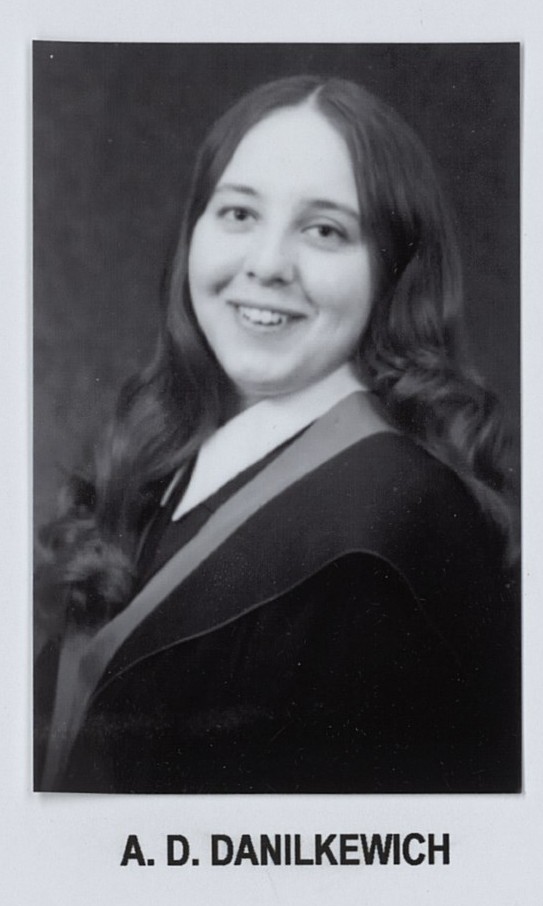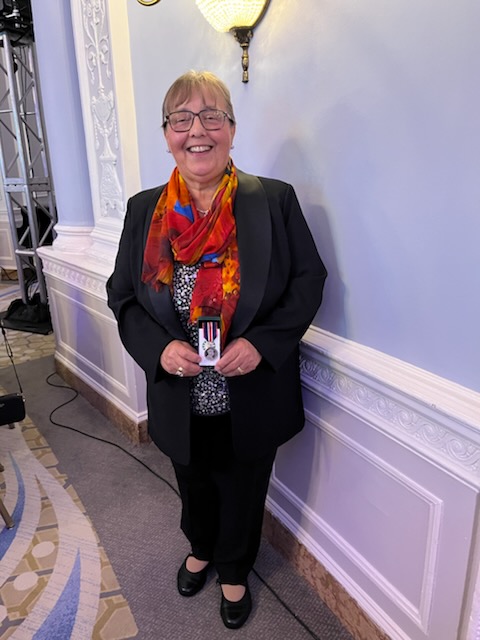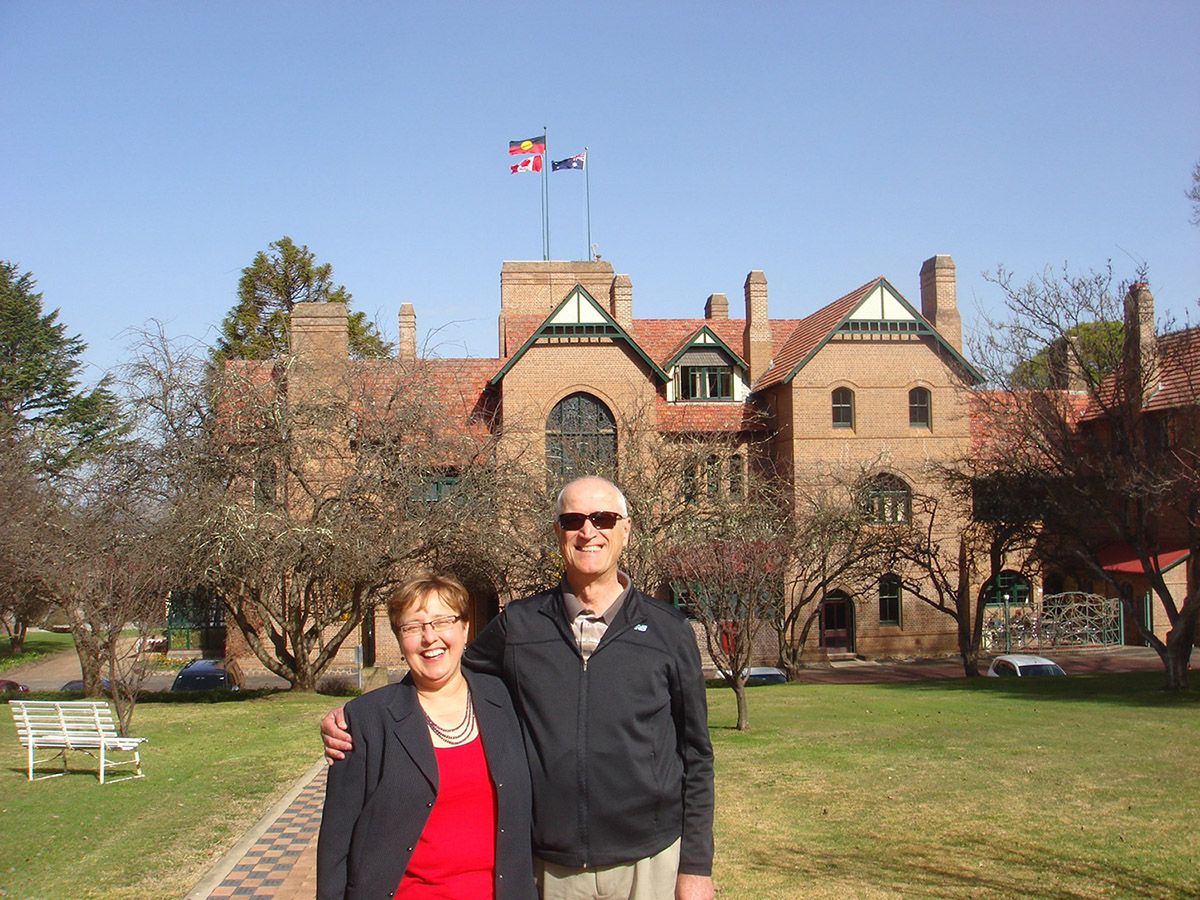
An advocate for women physicians
USask alumna Dr. Alanna Danilkewich (MD’75), one of this year’s Golden Grads, is known for her dedication to students, patients, and the medical profession.
By SHANNON BOKLASCHUKUniversity of Saskatchewan (USask) graduate Dr. Alanna Danilkewich (MD’75) has helped pave the way for women in medicine in Saskatchewan and beyond.
Earlier this year, Danilkewich—a retired family physician, medical educator, scholar, and mentor—was honoured with the King Charles III Coronation Medal, which recognizes individuals who have made a significant contribution to Canada. She was nominated for her advocacy for women’s issues in medicine and for her work in promoting gender equality for women physicians.
“When asked what advice I would pass on to the next generation, it would be ‘Go, girls, go—you can make a difference,’ ” Danilkewich said. “Work as a team and trust each other.”

Danilkewich earned her medical doctor (MD) degree 50 years ago, in 1975, making her one of this year’s Golden Grads. In an interview with the Green&White, Danilkewich reflected on her time as a USask student as well as on her employment in USask’s College of Medicine, where she served as head of the Department of Family Medicine prior to retiring in 2020 following an impactful 42-year career.
“I consider that my career as an academic family physician has been challenging, stimulating, rewarding, and fulfilling,” she said. “I always kept my goals in front of me even when times were difficult; one just has to heal the wounds of life and move forward believing you can make a contribution. Many young medical students and medical residents report that I inspired them, and many have followed in my footsteps.”
Danilkewich, who was born in the northern Saskatchewan town of Meadow Lake as the oldest of six children, grew up on a mixed farm. While she was always a motivated student who was interested in science, Danilkewich remembers that a career counsellor once tried to dissuade her from pursuing medicine because of her gender, because she grew up in a rural area, and because of a lack of school preparation in the sciences—but Danilkewich could not be deterred.
“I said, ‘I want to set my goal high. If I have to go down, let me try’—which is the way I’ve always been.”
In Grade 12, Danilkewich applied for admission to USask. She remembers her parents did not have the necessary funds to pay for her tuition, but the university had a program at that time to accept grain as payment.
“I wish I had a picture of us bringing the grain truck into the elevator on campus to pay my tuition,” she said. “That’s how I got to the university for pre-med.”
Danilkewich began her studies at USask’s College of Arts and Science with her sights set on studying medicine, but as a brand-new USask student she didn’t realize that she needed to apply to take the Medical College Admission Test (MCAT) in her first year of university. After missing a key deadline, she made an appointment to meet with the College of Medicine’s undergraduate dean to advocate for herself to be considered for admission into the College of Medicine at the same time as her peers.
“He said, ‘Sure. I like your energy, and I like your enthusiasm, and if you get good marks in your first year and you pass your MCAT and you get your qualifying numbers, we will interview you in the spring.’ And it all worked out,” Danilkewich recalled.
Danilkewich went on to study medicine at USask’s main campus in Saskatoon, earning her MD degree in 1975 before completing her family medicine specialty training in Regina from 1975 to 1977. As an academic family physician, she practiced the full scope of family medicine, which included 35 years of intrapartum obstetrics and 45 years of full emergency privileges and hospital privileges, as well as teaching undergraduate and post-graduate medical students and engaging in research and administration.
Early on in her career, Danilkewich noticed that too few women professors were occupying positions in medical colleges. As a medical student in 1972, Danilkewich joined the Federation of Medical Women of Canada (FMWC). She then went on to serve as the FMWC president from 1986-1987, which gave her an opportunity to meet influential women leaders.
“Some of the female physician leaders in the FMWC I networked with and were influential in my life’s journey were Doctors Hedy Fry, Roberta Bondar, Carolyn Bennett, Christina Hill, Shelley Ross, May Cohen, Mamta Gautman, Carol Herbert, Noni MacDonald, Sue Swiggum, Jane Philpott, and many others,” said Danilkewich.
“Being a member of the FMWC gave me much support and strength when I was the only female physician in my academic practice,” she said. “The knowledge that you were not alone was invaluable. Most of all, I cherish the friendships that I have made in Canada and through the world.”
In 1978, Dr. Louis Christ, the first head of the Department of Family Medicine at USask, invited Danilkewich to do a locum for him, which helped to launch her career as an academic and an assistant professor of family medicine.
“I moved from Prince Albert to Saskatoon and was charged with bringing women and children into the teaching unit,” said Danilkewich, who has since delivered more than 2,000 babies throughout her career.
“For the first years, I was the only woman on the Family Medicine faculty of 10—five in Saskatoon and five in Regina—allowing for ample opportunity to sit on many committees and to make changes to improve the lives of medical students and residents. At that time in Canada if a medical student was pregnant, she was pressured to drop out of her medical training,” she recalled.
In 1990, Danilkewich was elected to the first Gender Issues Committee of the Canadian Medical Association (CMA). She was part of the small committee of four members who edited the goals and objectives of the Medical Council of Canada Qualifying Examination with gender equity in mind.
“For this advocacy, I was awarded the YWCA Woman of the Year Award for Leadership in Women’s Health in 1993,” she said.

A career highlight for Danilkewich, who went on to serve as the head of the Department of Family Medicine at USask from 2010-2016, was beginning one of the first rural family medicine training programs in Canada, right here in her home province of Saskatchewan. Another goal she pursued was to encourage research in her specialty.
“I initiated and built the first Saskatchewan Family Medicine (FM) research program in 1990 based on the University of Western Ontario’s model. Every FM resident is exposed to research and evidence-based medicine and is expected to complete a project. We are now in our 37th year and are the envy of many other programs in Canada,” she said.
“My own FM research contributions are primarily in generalism, woman’s health, and gender studies,” Danilkewich added.
“I, and three others, authored a book, A Handbook on Sensitive Practice for Health Care Practitioners: Lessons from Adult Survivors of Childhood Sexual Abuse, published by Health Canada’s National Clearinghouse on Family Violence online and in book format. In 2016, I became a member of the Cochrane International Living Systematic Review Network and have published a few articles. My other knowledge contributions and articles are in the areas of patient-centered communication, solution-focused therapy, collaborative practice, the Patient’s Medical Home, medical education (undergraduate, postgraduate, rural medicine, distributed medical education, faculty development, continuing professional learning, and competency-based assessment), wellness, and the theory of system change using Kotter’s model.”
Danilkewich said she values having had the opportunity to hold many leadership positions at local, national, and international levels. For example, she is proud of her contributions to the College of Medicine, USask, the Saskatchewan Health Authority, the Medical Council of Canada, the Saskatchewan Health Quality Council, the College of Family Physicians, the Royal College of Physicians and Surgeons, the FMWC, the CMA, the Medical Women’s International Association, and to people at home and around the world.
A proud alumna, Danilkewich is also a longtime College of Medicine donor. She is particularly passionate about supporting students who are underrepresented in medicine, including women, racialized individuals, and learners from lower-income backgrounds. Supporting rural students is also close to her heart, as she was the first woman from Meadow Lake to get into medicine and she overcame personal barriers to do so. As a result, Danilkewich worked with the college’s advancement team to set up the Dr. Alanna Danilkewich Resident Award in Rural Family Medicine, an endowment that funds five awards each year, in the hopes it will inspire the next generation of rural medicine practitioners.
“Philanthropy is an important thing to me. I like to pay it forward. It’s a gratifying feeling to help students,” she said.
Throughout her career, Danilkewich has been honoured with numerous awards, including the Teaching Excellence Award in the College of Medicine in 2007; the Dr. Michael Krochak Award for Contributions to Family Medicine, through the Saskatchewan College of Family Physicians, in 2020; and an exceptional service award from the Saskatoon Regional Medical Association in 2021.
Since retiring in December 2020, Danilkewich enjoys growing orchids, flowers, and vegetables on her acreage on the bank of the South Saskatchewan River and spending time at her cabin in Meadow Lake Provincial Park.
“I consider my most important contribution to have been teaching and mentoring future generations of health professionals. Overall, I think that my career as an associate professor of family medicine has been very stimulating and rewarding,” Danilkewich said.

“I have been blessed with a great husband, Dr. Joseph Angel, PhD, and Professor Emeritus, Biochemistry, a supportive family, many friends and colleagues, great teaching patients and learners, good health, the passion for learning and growing, and the stamina and resilience to continue my life’s journey. I try to pay it forward and hope that I inspire others to do the same.”
